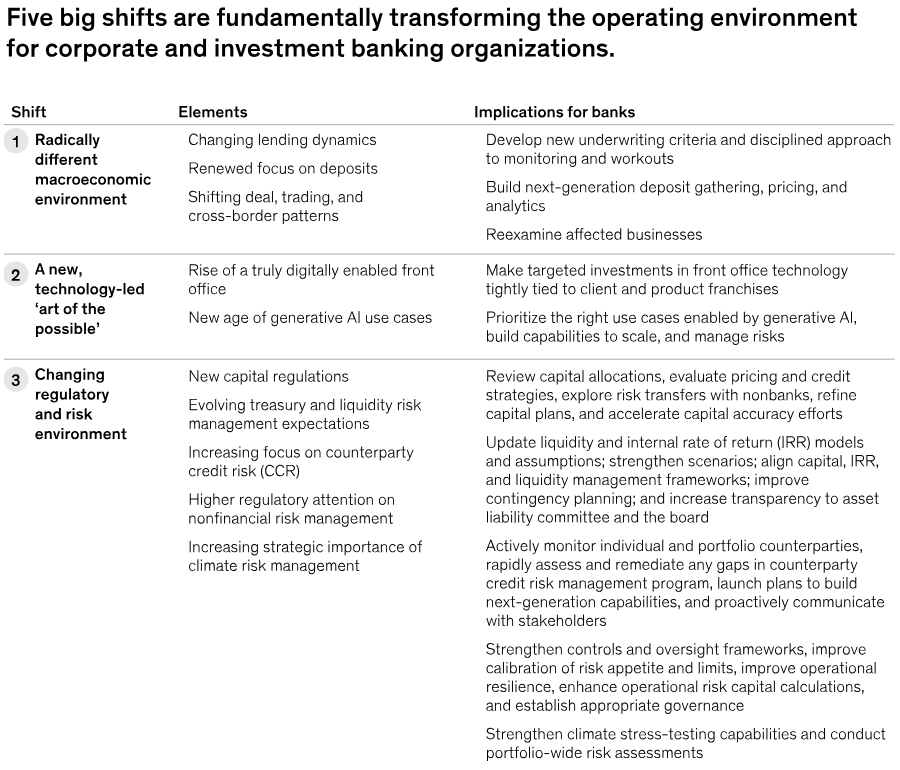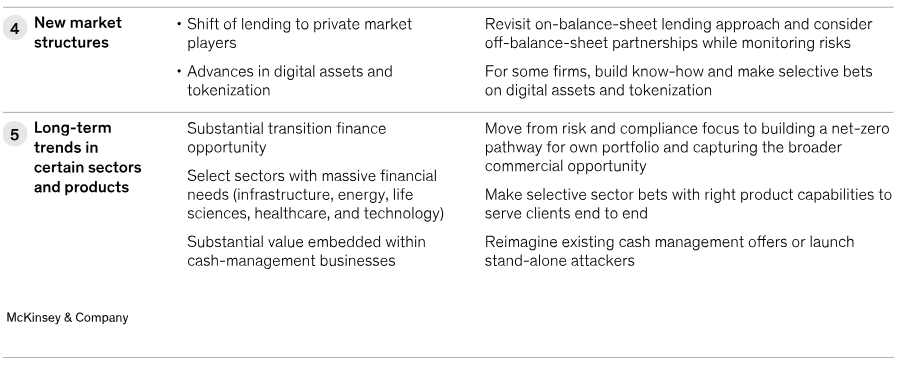
Here’s five big shifts that will shape corporate, investment banking in 2024
Shifting lending dynamics and regulations is changing the way they do business.
The corporate and investment banking (CIB) sector is expected to weather a changing regulatory environment as well as new market structures in 2024.
In a report, McKinsey & Company identified five key shifts that are transforming the operating environment of CIB organisations: a radically different macroeconomic environment; new technologies; changing regulatory and risk management environments; new market structures; and other trends.
Higher rates have changed lending dynamics, McKinsey analysts noted, increasing proiftability but creating challenges in legacy portfolios.
“There is a renewed focus on commercial deposits and on the liability side of the balance sheet,” McKinsey & Co. partner Fuad Faridi; senior partners Rushabh Kapashi and Matthieu Lemerle; and associate partner Vince Marriott wrote in a report.
Additionally, deal, trading, and cross-border patterns have been fundamentally disrupted.
The McKinsey analysts said that CIBs can respond by developing new underwriting criteria and taking a disciplined approach to credit monitoring and workouts of legacy portfolios; building next-generation deposit gathering, pricing, and analytics capabilities; and repositioning affected businesses.

Changing banking practices
Lending and cash management are two lines of traditional banking businesses that are increasingly disrupted by new players.
CIBs are now living in a world of increased lending by private credit players and the rise of tokenised assets.
CIB organizations looking to respond to the rise of direct lenders should consider revisiting their on-balance-sheet lending approach and taking advantage of off-balance-sheet partnerships and funds, whilst monitoring and managing the associated risks, the analysts said.
“CIB organizations that are attracted by the potential of digital assets and tokenization should build their understanding of these technologies before making selective bets, which might include building relationships within the existing ecosystem and participating in standard-setting efforts,” McKinsey added.
Meanwhile, CIB organizations are reportedly becoming keenly aware of the substantial value embedded within cash management businesses, the analysts said.
“[They] should consider reimagining their existing offerings or launching stand-alone attackers to unlock this potential,” McKinsey said.
Shifting tech, regulation
Technology and regulatory shifts are two other factors that are leading to vast changes in the operating environment of CIBs, McKinsey noted.
New technologies have changed the ways in which CIB organizations can engage with their clients, the analysts said, noting that organizations can now offer a truly digitally enabled front office and take advantage of a new wave of generative AI use cases.
“To capitalize on these opportunities, CIB businesses can make targeted investments that will drive productivity tailored to their unique client and product franchises. They will need to pay particular attention to choosing the right gen AI use cases, building capabilities that can scale, and managing the associated risks,” the report said.
Meanwhile, changing regulations is also changing the way CIBs must manage risk.
“Factors such as the finalization of foundational capital regulation and higher interest rates have resulted in increased volatility and risk exposure for CIB portfolios,” the analysts noted.
CIB organizations are advised to focus on building awareness of—and preparing appropriately for—new capital regulations, treasury and liquidity regulations, counterparty credit risk, nonfinancial risk, climate risk, and gen AI.
Net zero
CIB organizations must shift focus from risk and compliance to clinching commercial opportunities linked to these trends, the report noted.
Amongst long-term trends, net zero is likely to stay. And whilst trillions of dollars are necessary to finance the net-zero transition, CIB organizations should not just invest to meet goals but to finance the next wave of green businesses.
“There are also massive financial needs in other sectors, including infrastructure, energy, unfunded pension liabilities, and life sciences. To successfully pursue these opportunities, CIB organizations will need to focus on select areas where they can build the right product capabilities and serve clients end to end,” the report said.





















 Advertise
Advertise










